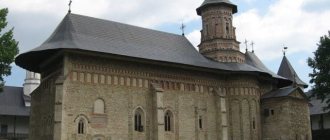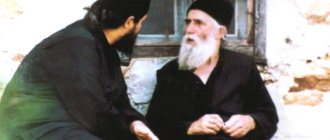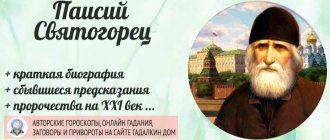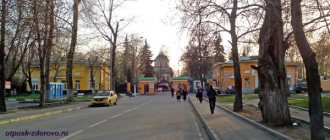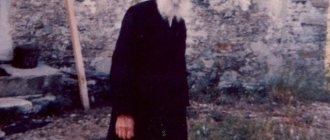Joy comes from sacrifice. True joy comes from curiosity. And if curiosity is cultivated, then the person celebrates, triumphs. Selfishness and selfishness are torment for a person; he gets stuck on this.
Once two young officers came to the Holy Mountain and told me: “We want to become monks.” - “Why do you want this? - I asked. “Since when did you have such a desire?” “But,” they answer, “it just appeared.” We came to the Holy Mountain on an excursion and now we are thinking of staying here forever. Out there in the world, who knows, maybe a war will break out!” “Yes,” I say, “you have no shame!” “Maybe a war will start!” And how could you leave the army?” “We’ll find,” they answer, “some reason.”
What will they find there? They will pretend to be mentally ill or come up with something else... But what can I say, they will definitely find something... “If,” I told them, “you are becoming a monk with such motivating reasons, then from the very beginning you have failed.”
But for other people, nothing has stopped them from getting married and starting a family for a long time. But they come to me and say: “Why should I get married? Can you start a family and raise children in such difficult times?” “Well,” I say, “did life stop during times of persecution? No one worked and got married? Maybe you’re just too lazy to start a family?” “I,” he answers, “want to become a monk.” - “But the reason is your laziness! Will you make a good monk?
Do you understand this? If a girl wants to become a nun, thinking like this: “Why would I stay in the world, get married, have children? Trouble, anxiety. I’d better go to the monastery. I will do what I am told, there is no responsibility, and if they scold me, I will bow my head lower. Try it, create your own home in the world! And in the monastery there will be everything necessary, a separate cell, ready-made food, etc...” - so, if a girl thinks like this, then let her know that she has already failed from the very beginning. Does this seem strange to you? Don't be surprised, such people really exist.
Know that a diligent person will succeed everywhere. A diligent family man would succeed in monasticism, and a diligent monk - if he chose the path of family life - would also succeed.
Troparion and Kontakion to St. Paisius the Holy Mountain
One young man entered the monastery as a novice, but refused to be tonsured. “Why, son, are you shying away from monasticism?” - I asked him. “And because,” he answers, “the monastic skufia reminds me of a soldier’s helmet!” Just listen! He didn’t want to become a monk so as not to wear a monk’s cap! She reminded him of a helmet! Has he ever put it on, this helmet? If he wore it, it was only a few times in the army during exercises - and even that is still in question! Where can he smell gunpowder in war? You see, she reminded him of the helmet! Do you hear what's going on? But what did he forget about monasticism? Tell me, please, what kind of monk will a person become if he begins monastic life in this way? In the end, this unfortunate man was tonsured as a monk somewhere, but he never wore a thick skuf.
From the publishers
Dear readers!
You are holding in your hands the first edition of the “Words” of Elder Paisius the Holy Mountain, published after his general church glorification as a reverend and God-bearing father[1]. If earlier the teachings of Elder Paisios were precious pearls, reflecting the experience of the highly respected ascetic of Holy Mount Athos, now the Church recognized that his life was holy and worthy of imitation, and his words belonged to the treasury of patristic writing, accurately expressing the sacred Church Tradition.
The relics of St. Paisius rest in Greece near Thessaloniki, in the hesychastery of St. John the Theologian near the village of Suroti. The special presence of Elder Paisius is felt there, and the sisters of the hesychastir are engaged in publishing the legacy of the monk. Since in Russia the Hesychastria has established friendly relations with the Holy Transfiguration Skete of the Danilov Monastery, it was our skete that the sisters entrusted with the preparation of a new edition of the “Words” of St. Paisius the Holy Mountain. Understanding the responsibility of this work, the brethren of the monastery and the Orfograph publishing house carefully double-checked the translation of the “Words,” corrected and supplemented the notes, and made new thematic indexes.
We hope that thanks to the fervent prayers and bold intercession before the Lord of our venerable and God-bearing father Paisius the Holy Mountain, this publication will serve the benefit of readers, encourage us all to “strive an honorable deed,” teach us to “include a good thought in our work,” and become an effective cure for many modern ailments .
Holy Transfiguration Skete, May 21, 2015, Ascension of the Lord
Synaxarion
Our venerable father Paisios the Holy Mountain was born from pious parents Prodromos and Eulogia in the village of Faras in Cappadocia in 1924, shortly before the tragic resettlement of the Asia Minor Greeks from their paternal homes to the borders of Mother Hellas. The newborn baby was baptized by the parish priest Faras, the Venerable Arsenios of Cappadocia, who shone in holiness. He gave the boy the name Arseny, thus wanting to “leave behind him a successor-monk,” as he himself said.
Having moved to Hellas, the family of the Monk Paisius settled in the Epirus city of Konitsa, where the monk grew up, feeding, as if on milk, stories about the miracle-filled life of St. Arsenios. Already at the age of five, the boy said that he wanted to become a monk. When Arseny learned to read and write, the Holy Gospel and the lives of the saints became his delight, and with ardent zeal he imitated the exploits of the venerable fathers. Having received his primary education, the boy wanted to study further not the sciences, but the craft of a carpenter - in order to imitate our Lord Jesus Christ in this. Becoming a carpenter, he worked diligently and carefully.
At the age of fifteen, he was awarded the merciful appearance of Christ. The Lord appeared to the monk after he wisely repelled the devil’s temptation of unbelief with his thoughts of love. After this, the fire of divine love and a fiery aspiration for monastic life flared up in Arseny’s heart even more strongly.
During the turmoil and war in Hellas (1940-1949), the monk, both as a civilian and as a warrior (he served as a radio operator in the army), showed unbending courage and self-sacrifice. He was ready at any moment to sacrifice even his own life to save others. Repeatedly finding himself under enemy fire, he saved his neighbors with his fiery prayer, and he himself was saved many times by the power of God.
After the war, Arseny worked as a carpenter for three years to financially support his brothers and sisters. At the age of 29, leaving the world and everything in the world, he retired to Holy Mount Athos. Inflamed by a strong desire for silence and constantly guided by Divine Providence, he labored in various monasteries of the Holy Mountain, and he also revived the monastery of the Most Holy Theotokos Stomion (not far from Konitsa), which had previously been desolate. In addition, the monk asceticised on Mount Sinai in the cell of Saints Galaktion and Epistimia. His entire life was unceasing fasting, unsurpassed abstinence, continuous vigil, undying prayer and active reading of the holy fathers. The monk especially loved to read Abba Isaac the Syrian. Father Paisius led an extremely austere life, with abstinence, courage and constant praise. Having humbly given himself to these supernatural feats, he defeated the many-wily devil, united with God and was consoled by divine joy. As if disembodied while living on earth, he became a citizen of Heaven, ascended to the heights of contemplation through action, became a participant in the heavenly mysteries, enjoyed the beauty of Christ and was greatly consoled by the blessings of the Mother of God.
The Monk Paisios was honored with the appearances of many saints: the Monk Arsenius of Cappadocia, the Monk Isaac the Syrian, the holy martyr Lucillian, the great martyr and healer Panteleimon, St. Blasius of Sklava, the Great Martyr Catherine, as well as the Great Martyr Euphemia the All-Praised, who visited him in the kaliva and talked with him for a long time. In addition to these phenomena, the monk saw his guardian angel, heard angelic chants and was illuminated by heavenly Light.
When the saint completely became light, it was no longer possible for him to remain in obscurity, although he himself very much desired this. His name became known everywhere, and many people of all ages and ranks flocked to him on the Holy Mountain, in his humble kaliva near Karyes, called “Panaguda”. There the monk lived the last 14 years of his earthly life. Desiring silence, he sought to move to an unknown place, so that from there he could invisibly show mercy to people and maintain peace through prayer. However, having received notification from above that this was not God’s will, the elder remained in his kaliva for the consolation and confirmation of all who came to him. At night he stood before God like a burning candle and prayed with pain for the whole world, remembering the many names of the living and the dead, and during the day he gave all of himself to the consolation of the people who flocked in rivers to his kaliva. Having become a faithful steward of the great gifts with which the Merciful God had endowed him, the Monk Paisius became the repository of the diverse gifts of the Holy Spirit: he called strangers who came to him by name, the secrets of human hearts were not hidden from him, he warned about future events, spoke to foreigners in their native languages, he healed bodily and mental infirmities and had power over unclean spirits, casting them out in the name of Christ. His speeches were like the words of God,
according to the Apostle, and pointed out to everyone the true purpose of earthly life - preparation for the future life, and encouraged people to repentance, confession and honest deeds.
In his dealings with people, the monk was sweet, simple, accessible, merciful, extremely comforting and, in a word, he was all love. But turning to those who wanted to break God’s law and fatherly traditions, the elder became like a fire-breathing lion. He especially took up arms against worldly wisdom, considering it a most dangerous trap for believers, and especially for monks.
This tireless ascetic, who suffered many physical illnesses from his youth, fell ill with cancer at the end of his life. The monk complacently endured the suffering that the tumor caused him, and died on July 12, 1994, having lived on earth for 70 years. He reposed in the sacred hesychastirium of St. John the Theologian, which is located near the village of Suroti, near Thessaloniki. He led the sisters of this Hesychastir for 28 years and donated to them the holy relics of St. Arsenius of Cappadocia, his godfather. The long-suffering body of the Monk Paisius rests in Suroti near the temple of St. Arsenios.
The Monk Paisius, while living on earth, gave himself entirely to God and people. Now, when he is in Heaven, God has given him to the entire universe.
Through His holy prayers, Lord Jesus Christ our God, have mercy on us. Amen.
Troparion to St. Paisius the Holy Mountain, Voice 5. Similar to: Meaningful Word:
Receiving the Divine fire of love, / you were all God with a superior feat, / and you were the consolation of many people, / you punished with divine words, / you worked wonders with prayers, / you were God’s Paisier. nose, / and now you pray unceasingly // for the whole world, Reverend.
Kontakion
Voice 8. Like: Climbed:
Lively on earth like an angel, / you shone with love, like Saint Paisius, / the great affirmation of the monks, / the leader of those faithful to the life of the saint, / the sweetest consolation of the universe appeared to you, / For this reason we call you: // Rejoice, universal father.
Did the Venerable Paisius the Svyatogorets write the “Words” of the Venerable Paisius the Svyatogorets
Dear friends! Readers asked us whether the “Words” of St. Paisius of the Svyatogorets really belonged to the authorship of St. Paisius.
The short answer: absolutely yes, the “Words” of St. Paisius the Holy Mountain are the authentic words of the holy Elder Paisius , which he himself spoke or wrote. These words of St. Paisius were carefully recorded for 28 years by the sisters of the monastery he founded (on a tape recorder or in shorthand), they were supplemented by excerpts from his letters, personal diary entries and books, which he also wrote in his own hand.
The sisters of the monastery of the Holy Apostle and Evangelist John the Theologian received from the Venerable Elder Paisius an oral and written blessing to systematize the words spoken and written by him and publish them, since the Venerable Paisius himself really wanted to write a book useful to everyone - both monks and laity, but did not have time to do this, giving all my time to the people I helped. Many years ago, the sisters blessed us with the translation of the books of St. Paisius the Holy Mountain into Russian and their publication and distribution in Russia, Ukraine and Belarus.
For those who are interested in the details and details of the compilation of the series of “Words” of the Venerable Paisius the Svyatogorets, we once again publish the preface of the all-honorable Mother Superior Philothea, abbess of the monastery of the Holy Apostle and Evangelist to the first volume of the “Words” of the Venerable Paisius the Svyatogorets, where the all-honorable Mother Abbess tells in detail how The work was carried out using the “Words” of St. Paisius the Holy Mountain:
PREFACE BY GREEK PUBLISHERS TO THE FIRST VOLUME OF THE “WORDS” OF THE REVEREND ELDER PAISIOUS OF THE SVATOGORTTS “WITH PAIN AND LOVE ABOUT MODERN MAN”
After his death in July 1994, Blessed Elder Paisius the Svyatogorets left a spiritual legacy to the world - his teachings. A simple monk, having received only a rudimentary education in primary school, but generously blessed with wisdom according to God, he truly exhausted himself for the sake of his neighbor. His teaching was not preaching or catechism. He lived the Gospel himself, and the teachings flowed from his own life, the hallmark of which was love. He “formed himself” according to the Gospel and therefore, first of all, he taught us with his entire appearance, and only after that - with his gospel love and God-enlightened word. When meeting people who were so different from each other, the elder did not just patiently listen to what they told him. With his characteristic holy simplicity and reasoning, he penetrated into the very depths of their hearts. The elder made their pain, their anxiety, their difficulties his own. And then, in an inconspicuous way, a miracle happened - a change in man. “God,” said the elder, “works a miracle when we heartily participate in the pain of another person.” We were happy to see with what interest the first books devoted to the life and teaching of Elder Paisius were read. Many people spoke with amazement that in these books they found answers to questions that tormented them, resolution of problems and consolation in sorrows. It was especially joyful for us to see how people who were far from the Church, having read about the Venerable Elder Paisius, became kindly concerned and changed their lives. In this regard, we were often reminded of the words of the church hymnal dedicated to St. Basil the Great: “He who died in the Lord also lives, and lives with us, just as he says from the books.”
At the same time, responding to the persistent requests of our brothers in Christ, we felt the need to acquaint them with the words of the Venerable Elder Paisius the Holy Mountain - words that we reverently wrote down from the very first steps of the life of our monastery and which brought us considerable benefit. By the Providence of the Good God, our monastic monastery owes its existence to Elder Paisius the Holy Mountain. It was Father Paisiy who received the bishop's blessing to found the monastery, and it was he who made efforts to ensure that a place for construction was found.
In 1966, having met Father Paisiy in the hospital, after he had undergone lung surgery, we came to his aid. Since then, being grateful to us with all his noble and sensitive heart, he felt like our elder brother and said that his duty was “to accommodate his sisters,” meaning the founding of the monastery. In October 1967, when the first sisters settled in the monastery, the Venerable Elder Paisius the Svyatogorets came to us and spent two months in the community, helping to establish the communal structure of the monastery.
Over the following years, while living on Mount Athos, Elder Paisios usually visited us twice a year, helping with his God-enlightened advice and personal example in the spiritual development of both the monastery as a whole and each of the sisters separately.
In addition, from the Holy Mount Athos, from this, as he said, “spiritual America,” the Venerable Elder Paisius the Svyatogorets helped us with his prayer and letters, which he sent to different sisters personally or all together. So, in 1967, Elder Paisios began to lay the foundations of the communal structure of our monastery. He delved into all aspects of the life of the monastery - from the simplest, everyday ones, to the most serious and spiritual.
He was then 43 years old, but he was already a perfect man according to the age of the fulfillment of Christ (Eph. 4:13). Even then, Father Paisiy possessed truly senile wisdom. From the very first days of the monastery’s existence, we treated his words as verbs of the eternal life (John 6:68) and realized that they were the initial and immutable truths on which our daily life should be built.
Therefore, fearing to forget what the elder said, we hastened to write down his words in order to use them in the future as a reliable canon of our monastic life.
When the first notebooks were filled with notes, we very timidly offered them to the elder for judgment. Why timidly? Because the elder always emphasized the importance of applying the teachings in practice, because he did not want us to only accumulate “raw materials”, “ammunition”, without putting what we heard into practice. He demanded that we work spiritually on what we heard or read.
Elder Paisios said that otherwise a lot of records and notes will not bring us any benefit, just as a lot of weapons and ammunition do not bring benefit to a state whose army is not trained and does not know how to use this arsenal.
Yielding to our persistent requests, Father Paisiy agreed to look through our notes and, if necessary (if something of his words was misunderstood by us), make his own corrections and additions.
The elder spiritually cared for our monastery for 28 years. All these years we have been recording his words: during meetings of the entire monastic community, as well as during meetings of the Spiritual Council of the monastery, at which he was present. At first, the sisters kept notes by hand, and in recent years, using a tape recorder. In addition, each nun of the monastery immediately after her personal conversations with the elder wrote down their contents. Having learned about all this, Father Paisiy even scolded us a little: “Why are you writing all this? Are you saving for a rainy day? The task is for you to work and apply what you hear in practice. And who knows what you wrote there! Come on, bring it to me to see!”
But when we showed him the notes of one of the sisters, the expression on his face changed, he calmed down and exclaimed with satisfaction: “That’s how it is, my brother! Yes, this sister is like some kind of tape recorder! Exactly as I said, so I wrote it down!..”
Usually our communication with the Monk Paisius the Svyatogorets was built in the form of his answers to our questions. The main topic of personal conversations with the sisters was always personal spiritual achievement.
Topics for the meetings of the Spiritual Council were prepared in advance. We brought to Father Paisius's judgment the questions that had accumulated during his absence - administrative and everyday, spiritual and social, church and national, and much, much more. Finally, during general monastic meetings, in addition to the questions asked by the sisters, the reason for the elder to start talking on some topic could be anything: the hum of a flying plane, the noise of an engine, the singing of a bird, the creaking of a door accidentally thrown by someone That's a word - the old man knew how to extract benefit from everything for the soul.
Any little thing or trifle could become a reason for a conversation on a serious topic. He said: “I use everything to connect with the heavenly, with Heaven. Do you know what kind of spiritual profit and spiritual experience a person gains if he spiritually works on everything that comes his way?” “The good God, first of all, cares about our future life and only then about earthly life,” said the Venerable Elder Paisius the Svyatogorets. He himself, communicating with people, had the same goal: by helping a person to know the will of God and unite with his Creator, Father Paisius prepared him for the Heavenly Kingdom.
When citing examples from the field of nature or science, art or everyday human existence, the elder did not consider them abstractly, in isolation from spiritual reality. He sought to awaken the souls of his interlocutors from sleep, with the help of a parable he helped them to comprehend the deepest meaning of life and “grab hold of God.”
The speech of Elder Paisius the Holy Mountain was distinguished by simplicity, wit, lively and genuine humor. He could express the great truth simply and joyfully. “I warm you like the sun,” the elder said, meaning that just as the warmth of the sun is necessary for flower buds to bloom, so a gentle pastoral touch to the soul helps it to reveal itself and heal from illness.
This was truly God-enlightened shepherding. It often prepared the ground for the soul to accept the strict word about the Gospel truth that does not allow compromise. Therefore, even the stern word of the Venerable Elder Paisius the Holy Mountain was perceived by the heart as beneficent dew. And subsequently, the hearts cultivated by the elder’s teachings bore spiritual fruit.
The records accumulated over 28 years, as well as the letters of Elder Paisius from the Holy Mountain, were systematized after his death. We have sorted the material into topics for more convenient use in our daily lives.
At the same time, we systematized the recorded incidents from the life of the elder, as well as the miraculous events that he happened to experience. Father Paisiy revealed all this to us not for the sake of self-praise.
With stories about himself, he truly gave us spiritual alms. “I’m telling you about all this,” he said, “not so that you can put medals on me and call me a good fellow. When I say something about the war, the army or something else, even if it’s funny, I’m saying it for a reason. I want to draw your attention to something, I want you to grasp the essence. I never say empty or useless things.”
Thus, Elder Paisios became a “spiritual donor.” He gave his blood to strengthen our weak, anemic faith.
Being truly the Royal Son of God, the elder sought to “touch” our curiosity and cultivate spiritual nobility in us, so that we would “become close to God.” “I scoop it out of myself, I scoop it out,” he said, “but what’s the end result? After all, in order to help you, I have to tell you very personal things. I am indulged in the greatest waste - I am wasting my spiritual reserve! Is this at least beneficial? I want to say that I lose every event that is told in order to help you, whether I’m talking about the manifestation of God’s Providence in my life or some miraculous event. Is there any benefit from this?
Taking into account that the years we are currently experiencing are very difficult, we decided to divide all the material at our disposal into separate volumes by topic and begin the publication of the “Words” of St. Paisius the Holy Mountain with those topics that are of broader interest.
Many of these questions are simple and everyday, however, if you do not treat them as the Gospel requires, the consequences will be sad (if not disastrous) both for the present and for the future life.
In the thematic selection of material and its preparation for publication, we were also inspired by Elder Paisius’s lifetime desire to write a book that “concerns everyone: laity, monks and clergy.”
Elder Paisius did not have time to carry out his plan, since he devoted all his time to the people who came to his kaliva. Despite the fading of his bodily strength, he gave himself to people without reserve.
In one of his letters from the Holy Mountain we read: “And my news is this: there are a lot of people - tired and exhausted. There are more and more people with their problems, but what can I say about my bodily strength - it’s better to pray that it does not decrease. I also have to take care of myself a little - after all, I never have the right to say “I can’t.” You can, you can’t, you have to be able to.”
As mentioned above, Elder Paisius the Svyatogorets usually answered our questions. Therefore, when compiling the book, the form of dialogue was preserved. Elder Paisius's answers are enriched with relevant passages from his letters to the monastery and to various persons, from books written by himself, from personal notes of sisters and other people that were made during or after conversations with him.
These additions to Elder Paisius’s answers to this or that question were made in order to reveal the topics with the greatest possible completeness. Effort was made to ensure that the liveliness and joyful tone of the elder’s oral speech were not lost when they were recorded on paper.
Some repetitions, with the help of which Elder Paisius wanted to especially emphasize one or another meaning of what was said, were not shortened by us. We have also preserved some of the interjections and exclamations that are often found in the oral speech of Elder Paisius and also express his great love for God and man.
The Venerable Elder Paisius the Svyatogorets often speaks about monastic life. The reason for this is not only that his speech was addressed to nuns. Elder Paisios wanted every person—whether he was a monk or a layman—to seek this “monastic joy,” which comes from a person’s complete self-giving to God.
In this way, a person is freed from the feeling of insecurity generated by faith in his “I”, and even in this life he tastes heavenly joy.
The book “With Pain and Love about Modern Man” is the first volume of the “Words” series by the Venerable Elder Paisius the Holy Mountain. For reader convenience, the volume is divided into four thematic sections. Each section, in turn, is divided into chapters, and each chapter into smaller chapters with corresponding subheadings.
Footnotes are provided mainly for people unfamiliar with church and patristic terminology.
As stated above, Elder Paisius the Svyatogorets often used examples from science, art and other special fields. Wanting to avoid errors in technical terms and expressions, we consulted with our brothers in Christ who are competent in this or that field. We sincerely thank them for the corrections they made, driven by their special reverence for the Venerable Elder Paisius.
We will be grateful to our readers for any advice and feedback. We prayerfully wish that the “spiritual waste” into which the Venerable Elder Paisius the Svyatogorets went out of his great love would benefit the simple and kindly disposed souls of the readers, and they would be enriched by Divine wisdom, hidden from the wise and prudent and revealed by an infant (see Luke 10:21). Amen.
June 14, 1998. All Saints Sunday. The abbess of the monastery of the holy Apostle and Evangelist John the Theologian, nun Philothea with the sisters in Christ.
If you want to buy books by St. Paisius the Svyatogorets right now on the Internet, with fast delivery throughout Russia and Belarus, please follow this link
You can also download the Life and all e-books of St. Paisius the Svyatogorets for reading on your phone/computer and other books from the Orfograph publishing house in our online store

